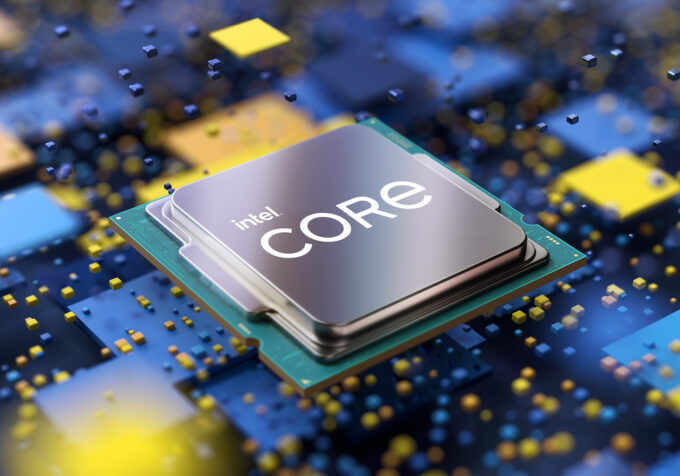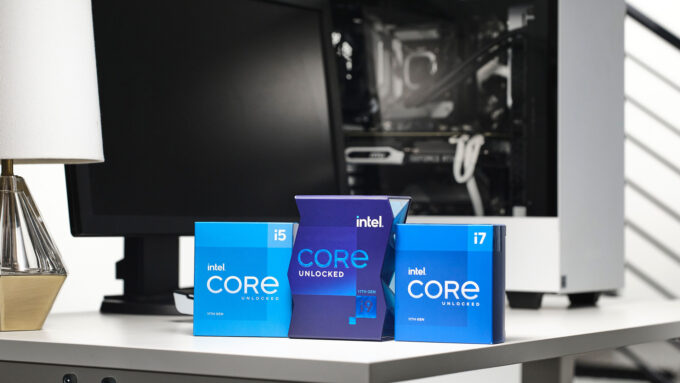- Qualcomm Launches Snapdragon 4 Gen 2 Mobile Platform
- AMD Launches Ryzen PRO 7000 Series Mobile & Desktop Platform
- Intel Launches Sleek Single-Slot Arc Pro A60 Workstation Graphics Card
- NVIDIA Announces Latest Ada Lovelace Additions: GeForce RTX 4060 Ti & RTX 4060
- Maxon Redshift With AMD Radeon GPU Rendering Support Now Available
14nm Refined (Again): Intel Launches Its 11th-gen Core Processor Series
It’s been a fairly busy year so far for CPU launches, with AMD being responsible for the lion’s share up to this point. Intel’s beginning to make some big moves, however, starting today, with the official launch of its 11th-gen Core processors. While Intel targets many folks with its new series, gamers are the biggest focus, with the company pushing clock speeds harder than ever before.
As we covered a few weeks ago, these new Rocket Lake-S processors are built around Intel’s polished 14nm process, and introduce Cypress Cove cores that deliver some new features to the mainstream desktop, including AVX-512 and Deep Learning Boost. As you can see in the product table below, Intel’s 11th-gen marks the first official support for DDR4-3200 memory speeds.
Here’s Intel’s full 11th-gen desktop lineup:
| Intel Processor Lineup | |||||||||
| Cores | Clock | Turbo | All Core | Cache | Memory | IGP | TDP | Price | |
| Core X-Series | |||||||||
| i9-10980XE | 18 (36T) | 3.0 GHz | 4.8 GHz | 3.8 GHz | 24.75MB | 4-Chan 2933 | No | 165W | $979 |
| i9-10940X | 14 (28T) | 3.3 GHz | 4.8 GHz | 4.1 GHz | 19.25MB | 4-Chan 2933 | No | 165W | $784 |
| i9-10920X | 12 (24T) | 3.5 GHz | 4.8 GHz | 4.3 GHz | 19.25MB | 4-Chan 2933 | No | 165W | $689 |
| i9-10900X | 10 (20T) | 3.7 GHz | 4.7 GHz | 4.3 GHz | 19.25MB | 4-Chan 2933 | No | 165W | $590 |
| Core Series | |||||||||
| i9-11900K | 8 (16T) | 3.5 GHz | 5.3 GHz | 4.7 GHz | 16MB | 2-Chan 3200 | Yes | 125W | $539 |
| i9-11900KF | 8 (16T) | 3.5 GHz | 5.3 GHz | 4.7 GHz | 16MB | 2-Chan 3200 | No | 125W | $513 |
| i9-11900 | 8 (16T) | 2.5 GHz | 5.2 GHz | 4.6 GHz | 16MB | 2-Chan 3200 | Yes | 65W | $439 |
| i9-11900F | 8 (16T) | 2.5 GHz | 5.2 GHz | 4.6 GHz | 16MB | 2-Chan 3200 | No | 65W | $422 |
| i7-11700K | 8 (16T) | 3.6 GHz | 5.0 GHz | 4.6 GHz | 16MB | 2-Chan 3200 | Yes | 125W | $399 |
| i7-11700KF | 8 (16T) | 3.6 GHz | 5.0 GHz | 4.6 GHz | 16MB | 2-Chan 3200 | No | 125W | $374 |
| i7-11700 | 8 (16T) | 2.5 GHz | 4.9 GHz | 4.4 GHz | 16MB | 2-Chan 3200 | Yes | 65W | $323 |
| i7-11700F | 8 (16T) | 2.5 GHz | 4.9 GHz | 4.4 GHz | 16MB | 2-Chan 3200 | No | 65W | $298 |
| i5-11600K | 6 (12T) | 3.9 GHz | 4.9 GHz | 4.6 GHz | 12MB | 2-Chan 3200 | Yes | 125W | $262 |
| i5-11600KF | 6 (12T) | 3.9 GHz | 4.9 GHz | 4.6 GHz | 12MB | 2-Chan 3200 | No | 125W | $237 |
| i5-11600 | 6 (12T) | 2.8 GHz | 4.8 GHz | 4.3 GHz | 12MB | 2-Chan 3200 | Yes | 65W | $213 |
| i5-11500 | 6 (12T) | 2.7 GHz | 4.6 GHz | 4.2 GHz | 12MB | 2-Chan 3200 | Yes | 65W | $192 |
| i5-11400 | 6 (12T) | 2.6 GHz | 4.4 GHz | 4.2 GHz | 12MB | 2-Chan 3200 | Yes | 65W | $182 |
| i5-11400F | 6 (12T) | 2.6 GHz | 4.4 GHz | 4.2 GHz | 12MB | 2-Chan 3200 | No | 65W | $157 |
| i3-10325 | 4 (8T) | 3.9 GHz | 4.7 GHz | 4.5 GHz | 8MB | 2-Chan 2666 | Yes | 65W | $154 |
| i3-10305 | 4 (8T) | 3.8 GHz | 4.5 GHz | 4.3 GHz | 8MB | 2-Chan 2666 | Yes | 65W | $143 |
| i3-10105 | 4 (8T) | 3.7 GHz | 4.4 GHz | 4.2 GHz | 6MB | 2-Chan 2666 | Yes | 65W | $122 |
| i3-10105F | 4 (8T) | 3.7 GHz | 4.4 GHz | 4.2 GHz | 6MB | 2-Chan 2666 | No | 65W | $97 |
| 11th-gen 35W Series | |||||||||
| i9-11900T | 8 (16T) | 1.5 GHz | 4.9 GHz | 3.7 GHz | 16MB | 2-Chan 3200 | Yes | 35W | $439 |
| i7-11700T | 8 (16T) | 1.4 GHz | 4.6 GHz | 3.6 GHz | 16MB | 2-Chan 3200 | Yes | 35W | $323 |
| i5-11600T | 6 (12T) | 1.7 GHz | 4.1 GHz | 3.5 GHz | 12MB | 2-Chan 3200 | Yes | 35W | $213 |
| i5-11500T | 6 (12T) | 1.5 GHz | 3.9 GHz | 3.4 GHz | 12MB | 2-Chan 3200 | Yes | 35W | $192 |
| i5-11400T | 6 (12T) | 1.3 GHz | 3.7 GHz | 3.3 GHz | 12MB | 2-Chan 3200 | Yes | 35W | $182 |
| i3-10305T | 4 (8T) | 3.0 GHz | 4.0 GHz | 3.7 GHz | 8MB | 2-Chan 2666 | Yes | 35W | $143 |
| i3-10105T | 4 (8T) | 3.0 GHz | 3.9 GHz | 3.6 GHz | 6MB | 2-Chan 2666 | Yes | 35W | $122 |
You might notice that not all of the chips in the table above are part of the 11th-gen series, such as the i3-10105T. Intel notes these particular chips are “refreshed”, although we’re not entirely sure if much was changed – especially considering the max memory supported speed is 2666MHz. That’s too bad in some ways, since AMD’s previous-gen bottom-end parts have supported 3200MHz just fine (even the low-end quad-core Ryzen 3 3100).
As before, Intel is offering GPU-less versions of many of its chips, with the KF in the name being your tip-off. Unlike last generation, Intel’s top-end Core chip is eight core, rather than ten. We still feel this is a strange move, but it seems obvious that Intel cared more about clock speed this generation above all else, in its continued attempts to top the gaming performance charts.
On that note, we’re running behind on our 11th-gen launch content due to other projects in the works, but we’ll launch later this week with a look at gaming performance on the latest top-end Core i9-11900K, last-gen i9-10900K, and comparative AMD CPUs. We’ll follow-up with a creator look later, although we honestly don’t expect any surprises. Our recent workstation CPU performance deep-dive should still satiate all appetites. In fact, if you want Intel Core for a workstation, the last-gen 10-core option hasn’t lost its luster even though it’s technically been succeeded.
Funny enough, some motherboard vendors released a new EFI update for some of its Z590 models today, so it might almost be a good thing that we haven’t tested yet, to ensure we’ll get the best possible performance out of our rigs. Either way – stay tuned.






